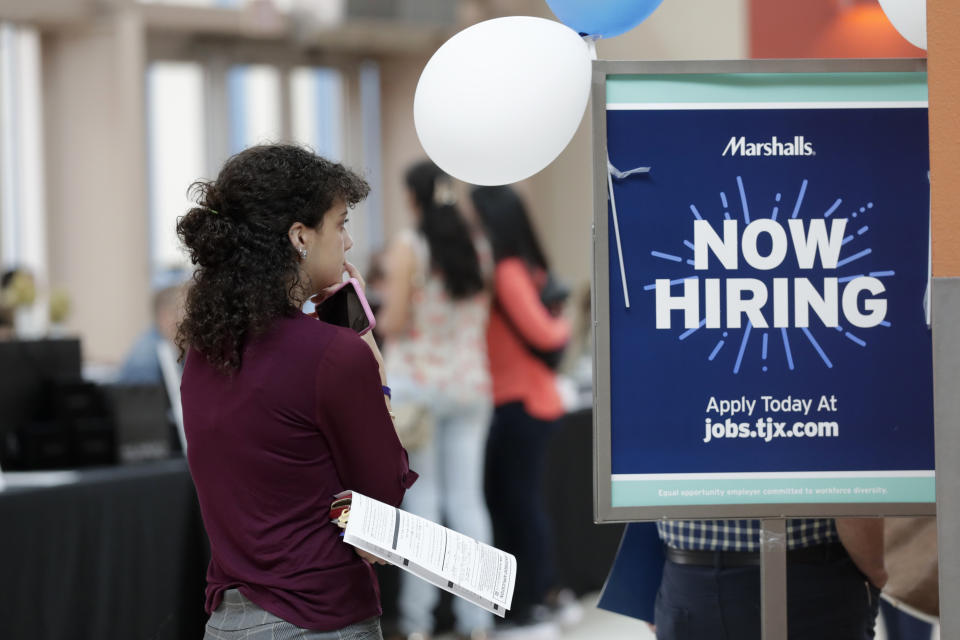Why we can't say the US economy has turned a corner just yet: Morning Brief
Friday, October 25, 2019
The labor market is still soft
On the surface, it appears the U.S. economy has shed the recession fears that permeated markets in late summer.
The first look at manufacturing and service-sector activity from IHS Markit published Thursday showed overall output in the economy hit a three-month high in October. Meanwhile, manufacturing activity this month hit a six-month high after September revealed the manufacturing sector was in its worst state since the financial crisis. Against this background, Thursday’s report should make recession fears abate.
And indeed, markets have been calling off the most anticipated recession in history for weeks now.
The Treasury yield curve has steepened and un-inverted, a sign that investors are betting on improved economic prospects. The yield on a 10-year Treasury (^TNX) now stands at 1.75%, while the 30-year yield is at 2.24% — and each rate is up around 20 basis points in the last three weeks. From their late-summer lows, both yields are up around 30 basis points.
And looking at the stock market since the most recent lows hit on August 23, cyclical sectors like financials (XLF) and industrials (XLI) — along with the consumer-focused retail sector (XRT) — have outperformed the S&P 500 Index (^GSPC). So, while economic growth might not be roaring right now, the stock market has for some time now been betting that the case for recession is weakening.

But Thursday’s data also doesn't completely put to rest fears about how an economic soft patch may in fact turn into a full blown recession.
Because the labor market is still challenged, it puts prospects for consumers at risk. Increasing employment backstops consumer spending. And consumer spending accounts for 70% of economic growth. So if people don't have jobs, they won't spend money. And if people don't spend money, the economy doesn't grow.
IHS Markit said Thursday that employment numbers in its surveys fell for a second month, and declined at the steepest rate since December 2009. Respondents indicated that more cautious hiring strategies and a lack of new work to replace completed jobs weighed on the labor market.
"The overall subdued picture reflects a spreading of economic weakness from manufacturing to services," said Chris Williamson, chief business economist at IHS Markit. He added that "encouragingly we are now seeing some signs of manufacturing pulling out of its downturn, in part driven by a return to growth for exports and improved sentiment about the year ahead, linked to hopes that trade war tensions are starting to ease."
Williamson said Thursday’s data points to job gains in the U.S falling below 100,000 per month. In September, the U.S. economy created 136,000 new jobs while the unemployment rate fell to 3.5%, the lowest since 1969.
For years, economists have argued that hiring would naturally slow as labor slack was taken up, with the economy needing to create fewer than 100,000 jobs each month to sustain the expansion. The challenge for investors in the months ahead, then, will be teasing out whether a slowing labor market signals recession ahead — or if economists were right after all.
By Myles Udland, reporter and co-anchor of The Final Round. Follow him @MylesUdland
What to watch today
Economy
10 a.m. ET: University of Michigan Consumer Sentiment, October final (96.0 prior)
Earnings
Pre-market
6:55 a.m. ET: VF Corp (VFC) is expected to report adjusted earnings of $1.31 per share on $3.42 billion in revenue
7 a.m. ET: Verizon (VZ) is expected to report adjusted earnings of $1.24 per share on $32.75 billion in revenue
Top News

Amazon's stock swoons after Q3 earnings miss, even as revenue beats [Yahoo Finance]
China to ask U.S. to remove tariffs in exchange for ag buys in talks Friday [Reuters]
Lion Air crash report points to Boeing, pilots, maintenance [AP]
AB InBev’s China slump wipes out $20 billion in market value [Bloomberg]
YAHOO FINANCE HIGHLIGHTS
2019 may be the year for an epic Santa Claus rally on Wall Street
The staggering cost of Elizabeth Warren’s plans: $4.2 trillion per year
A new tax study should freak out billionaires
Follow Yahoo Finance on Twitter, Facebook, Instagram, Flipboard, SmartNews, LinkedIn, YouTube, and reddit.

